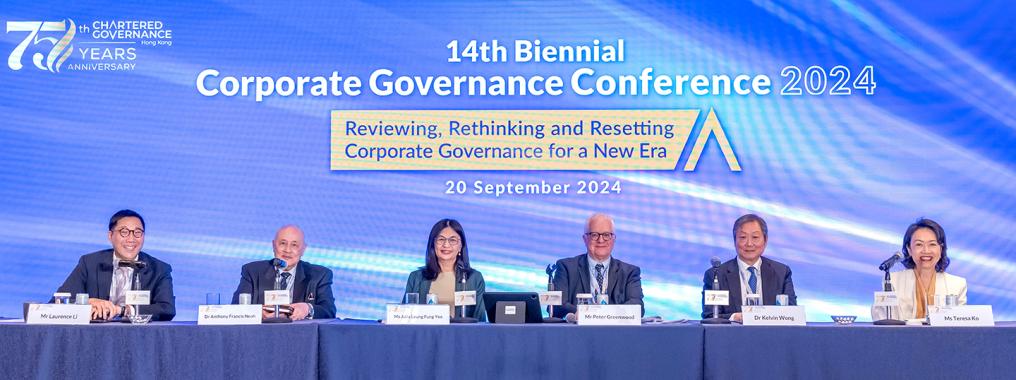
Professor Patrick Wong BBS JP FCG HKFCG and The Honourable Edmund Wong FCG HKFCG
This new column, as a successor to the NextGen series, launches this month with a father-and-son team sharing their views on work, life and all things governance.
You are a father-and-son team and are both Institute members. When did you first join and what has been your role in the Institute?
Patrick: ‘I joined the Institute as an Associate after passing my exams in 1972. Over a decade later, I became a Fellow when I stood for election to Council, which I served on between 1999 and 2003.’
Edmund: ‘I joined in 2017 as an Associate and became a Fellow in 2019.’
Has membership of the Institute supported your career development and, if so, in what ways?
Patrick: ‘As an accountant, having the title of Chartered Secretary was very useful, especially when working on incorporation-related matters. In those days, holding this title was considered very prestigious because the exams were known to be difficult. Passing them meant your knowledge of company law and proficiency in English were of a high standard – not many had this qualification. When I was younger, I worked on various internal control systems and having the Institute’s qualification helped me secure contracts with major organisations and the government.’
Edmund: ‘After graduating around a decade ago, I worked in accounting and auditing, helping companies detect or prevent issues. I realised that many problems stemmed from poor corporate governance. Accountants not only advise clients, but also often serve as NEDs or INEDs on listed companies – attaining the Institute’s qualification and its specialised knowledge was beneficial in this regard. Good corporate governance is crucial for ensuring our financial systems and capital markets are robust.’
How do you think governance as a profession has evolved since you joined the Institute?
Patrick: ‘There has been significant change. Hong Kong is placing increasing importance on governance, which I see as a positive development. In the past, a Chartered Secretary’s role mostly revolved around company secretarial work, but corporate governance professionals in listed companies now hold a more extensive range of professional qualifications. Having the Institute’s qualification allows us to contribute more meaningfully to governance committees and our opinions carry more weight.’
having the Institute’s qualification allows us to contribute more meaningfully to governance committees and our opinions carry more weight
Professor Patrick Wong BBS JP FCG HKFCG
Founder of Patrick Wong CPA Ltd
Edmund: ‘There are more career opportunities today for governance professionals, beyond compliance work. For example, the Institute’s new AML/CFT Certification Course demonstrates the role corporate governance plays in preventing money laundering and terrorist financing. We also place a far greater emphasis on ESG.’
What are some of the pivotal moments in the Institute’s development over the years?
Patrick: ‘In the beginning, the Institute didn’t have much exposure in the Chinese mainland. Thanks to ongoing efforts, the Institute has a well-established representative office in Beijing and mainland membership is expanding, including to board secretaries. The Chinese mainland is a huge market and many state-owned enterprises are now listed in Hong Kong.’
Edmund: ‘Chartered Secretaries used to concentrate more on compliance and the Listing Rules, but there’s now a far broader perspective on governance. The Institute’s role has shifted along with market demands, which is an important advance.’
How has obtaining professional qualifications changed over the years?
Patrick: ‘Back then, we had to sit for exams following the UK system, which involved completing 17 papers – many people were unable to obtain a pass. The professional landscape has changed a lot. When I studied accountancy at PolyU, a specialised company secretarial course was only introduced when I graduated. The profession is becoming increasingly specialised.’
Edmund: ‘I didn’t take the exams, but instead took an Institute-accredited master’s degree in corporate governance. The curriculum involved both accounting and legal training, which explains why many lawyers and accountants go on to gain professional qualifications in corporate governance. The Institute has also introduced several initiatives to attract more members through alternative routes to qualification, boosting recognition of the profession.’
What advice would you give to the younger generations starting their governance careers?
Patrick: ‘In addition to enhancing professional knowledge, it’s important to be meticulous and patient, and to take your work seriously. Strengthening your language skills is also crucial. In this field, you’ll handle many documents, and, if your language skills are poor, you might struggle to understand them or to express yourself clearly. I advise young people to read more, write more and seek advice from others.’
Edmund: ‘Joining professional bodies or societies is the first step, but more important is having a mindset of continuous learning. Society is constantly evolving, while expectations from regulators and stakeholders are escalating. I encourage young people to continuously absorb the latest knowledge and apply it in their work. Participating in Institute activities definitely helps with ongoing education and learning.’
Patrick, can you share some of your golden memories of the Institute’s early days?
Patrick: ‘In 1998, I helped organise the first Corporate Governance Conference and, since I worked in the community and had close ties with government officials, I was responsible for arranging the speakers. I cherish the memory of that whole experience. Corporate governance was then still a novel concept and the Institute was relatively young. We didn’t have as many members or as much recognition as we do today and we worried about whether the seminar would be successful. To our surprise, it paved the way for future conferences and has remained a popular event.’
Edmund, as the second member of your family to join the Institute, were you inspired by your father to become a governance professional?
Edmund: ‘In many ways, yes. However, due to the generation gap our focus and work are somewhat different. My father initially encouraged me to obtain the CPA qualification. As he was so involved in much of the Institute’s early work, I saw its growing influence and recognition over time. This was one of the key factors in my decision to join the Institute.’
good corporate governance is crucial for ensuring our financial systems and capital markets are robust
The Honourable Edmund Wong FCG HKFCG
Member of the Functional Constituency, Accountancy, Legislative Council, HKSAR Government, and Practising Director of Patrick Wong CPA Ltd
这个新专栏作为新一代治理系列的继任者,于本月推出,这对父子将分享他们对工作、生活和治理的看法。
你们是一对父子,都是公会的资深会士。你们什么时候加入公会的?在公会担任什么职务?
黄教授:‘我1972年考完试后便加入公会,成为会士。十几年后,因为要选理事会才转为资深会士。我在1999年至2003年期间担任了几个任期。’
黄议员:‘我2017年加入做会士,並在2019年转为资深会士。’
公会的会员资格是否支持了您的职业发展?如果有,以何种方式?
黄教授:‘ 作为会计师,我认为拥有特许秘书的资格对工作有很大帮助,尤其是会计师需要做公司注册等相关的工作。当年,特许秘书是一个享有盛誉的行头。因为考试困难,通过这些考试意味着你对公司法的了解和英语熟练程度都达到了很高的标准——没有多少人有这个资格。年轻时我做很多内部监控的工作,拥有公会的资格让我接到了很多大机构甚至政府的工作。’
黄议员:‘我十几年前毕业后做会计与审计工作,去帮企业侦查或者防止问题的发生。我发现,许多问题的根源是治理做得不好。会计师除了建议客户,有很多时候也会做上市公司的非执行董事和独立非执行董事,拥有公会的资格并了解专业知识在这方面有很大的帮助。良好的公司治理非常重要,可以确保我们的金融系统和资本市场稳健。’
自您加入公会以来,治理作为一项专业发生了怎样的变化?
黄教授:‘变化很大。香港越来越注重治理,我认为这是一个正面的发展。过去,特许秘书的职责主要围绕公司秘书工作, 但现在上市公司的公司治理专业人员拥有更广泛的专业资格。持有公会的资格也让我们能够在治理委员会给予更多意见,提出的意见也更加有分量。’
黄议员:‘公司治理专业人员现在除了做合规工作,也有更多发展方向。例如从公会推出的反洗钱及反恐融证书课程,就可以见到公司治理在反洗黑钱及恐怖融资活动上面所扮演的角色。我们亦更加注重ESG。’
多年来,公会的发展经历了哪些关键时刻?
黄教授:‘过去,公会在中国内地的曝光度并不高。经过不断的努力,公会已在北京设立了代表处,并且内地会员数量正在不断增加,其中包括董事会秘书。中国内地是一个很大的市场, 也不少国有企业在香港上市。’
黄议员:‘以往特许秘书可能做合规或者看上市规则多一些, 现在则更注重在宏观的公司治理上。公会的定位随着市场关注而转变,是一个重要的发展。’
这几年,获取专业资格的方式有何变化?
黄教授:‘当时我们要按照英国的制度参加考试,需要完成17份试卷,很多人都无法通过。职业格局也发生了很大变化。当年我在理工大学读会计,到我差不多毕业的时候才出现了专门的公司秘书课程,我觉得这个行业越来越趋向专业化。’
黄议员:‘我不是考试,而是透过修毕公会认可的公司治理硕士之后入会的。我们的课程一半是会计一半是法律,解释了为什么有这么多律师和会计师后来获得公司治理专业资格。我也留意到现在公会有更多的新措施去吸纳不同的会员,让公司治理专业成为更广泛认可的资格。’
您对刚刚开始治理生涯的年轻一代有什么建议?
黄教授:‘增进专业知识的同时,要心思细密,有耐性,并对工作抱持认真的态度。加强语言能力也很重要。做这一行需要经手许多文件,如果语言能力根底不好,除了可能看不懂文件以外,写的东西出来也可能会词不达意。我建议年轻人多看书,多撰写文章,并多寻求他人的建议。’
黄议员:‘加入专业团体或者学会是第一步,更重要的是要有持续学习的态度。社会不停转变,监管机构或者持份者对我们的期待都持续增加。我建议年轻人要不断吸收最新的知识,并应用在工作上。参与公会的活动也可以帮助我们持续进修和学习。’
黄教授,您能否分享一些公会成立初期的美好回忆?
黄教授:‘我在1998年帮忙举办了第一届的公司治理研讨会。由于我的工作常常跑社区,和政府官员比较熟悉,当年我负责邀请讲者,令我印象深刻。当时公司治理还是很新颖的概念,公会也还相对较年轻,会员数量没有现在那么多,认受性也没有今天那么高,我们很担心举行研讨会是不是能成功。令我们惊讶的是,它为未来的会议开了先河,到今天它仍然是一项受欢迎的活动。’
黄议员,作为您家里第二个加入公会的第二代成员,您是否受到父亲的鼓励而成为一名治理专业人士?
黄议员:‘多少有的,虽然因为年代差异,我们注重的与做的东西都不太相同。我的第一个CPA资格是受到父亲的鼓励。父亲也参与了许多公会早期的工作,我见到公会的影响力和认受性随着时间增加,这是我加入公会并成为治理专业人士的其中一个重要因素。’


